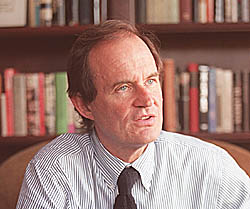The New York Times
January 8, 1999
The Prosecution Almost Rests
Government Paints Microsoft as Monopolist and Bully
By STEVE LOHR
WASHINGTON -- As the last Government witness nears the end of his testimony, it is increasingly clear that the Government's antitrust case against Microsoft is an indictment not only of the business practices of the world's dominant software maker but also of its corporate character.
Justin Lane for The New York TimesJohn L. Warden, William H. Neukom and Richard Urowsky. ``The Government is just mudslinging,'' Warden said.
Witness after witness -- an executive roll-call of companies that drive today's economy, including Intel, I.B.M., Netscape Communications, America Online, Sun Microsystems and Apple Computer -- has portrayed the Microsoft Corporation as a bullying monopolist. The Justice Department charges that Microsoft is guilty of a litany of misconduct, including illegally using its market muscle to impose restrictive contracts, to engage in predatory pricing and to attempt to divide markets.
Microsoft took each step, the Government contends, to stifle competition and thwart the challenge that Internet software posed to its monopoly product, the Windows operating system, the computing equivalent of the telephone dial tone.
On its face, the Government's case seems sweeping and persuasive. Yet as the trial has plodded since October through lengthy cross-examination of each witness, with both sides presenting mountains of e-mail and documents to support their arguments and counterarguments, there is certainly room for doubt. Each disputed meeting, contract and product strategy is open to interpretation.
There is no jury in this trial; Judge Thomas Penfield Jackson must wade through all the conflicting evidence and decide whether Microsoft's motives were mainly to impede competition or to improve its products. In determining which side to believe, he will inevitably be guided by his own judgment of whether Microsoft is a vigorous competitor or predatory monopolist.
That is why the Justice Department has gone to such lengths to depict Microsoft as a corporate bad guy and its chairman, William H. Gates, as evasive, uncooperative and less than truthful in the videotaped excerpts of his deposition testimony shown repeatedly in court.
The Microsoft e-mail and strategy documents show, at the least, a no-holds-barred approach to competition. In colorful language, they outline plans to "kill," "pollute" and "subvert" the products of rivals. Marketing campaigns are referred to as jihads.
Microsoft's world view seems tinged with paranoia.
Microsoft's world view seems tinged with paranoia. Close partners like the Compaq Computer Corporation and the Intel Corporation are at times painted as enemy conspirators. Nor are all the threats, apparently, outside the corporate campus in Redmond, Wash. In a 1997 e-mail to Gates, a senior Microsoft executive, warned, "In my opinion, Windows is in the process of being exterminated here at Microsoft."Other Government evidence seeks to show that Gates remained dismissive of a long-running antitrust investigation, even after Microsoft signed a consent decree with the Justice Department in 1994. At a 1995 meeting with Intel, he said, according to an Intel executive: "This antitrust thing will blow over. We haven't changed our business practices at all."
Microsoft insists that its corporate culture is one of "constructive paranoia," insuring that it does not lose its competitive edge. Besides, Microsoft's legal team argues, inflammatory e-mail and unguarded comments have no standing in an antitrust case, which should be based on facts and figures.
"The antitrust laws are not a code of civility in business," John L. Warden, Microsoft's lead trial lawyer, told the court in his opening statement.
For the Prosecution
The prosecution and the defense are each allowed 12 witnesses. These are nine of the witnesses the Government called to testify.James L. Barksdale
President and chief executive, Netscape
Microsoft executives, at a 1995 meeting, proposed that Microsoft and Netscape divvy up the market for Web browsers.David M. Colburn
Senior vice president, America Online
In return for ending its deal with Netscape and switching its users to Microsoft's browser, AOL received a Windows 95 link.Avadis Tevanian Jr.
Senior vice president, Apple Computer
Microsoft threatened to stop developing software for the Macintosh unless Apple dropped its support for Netscape.Steven D. McGeady
Vice president, Intel
Microsoft stopped Intel's software efforts by threatening to drop Intel's microprocessors.John Soyring
Director, network computing software, I.B.M.
Through restrictions on developers, Microsoft prevented I.B.M's OS/2 operating system from effectively competing with Windows.David J. Farber
Computer science, University of Pennsylvania
Microsoft is wrong to claim that bundling Internet software with Windows improves the efficiency of both products.James A. Gosling
Vice president, Sun Microsystems
Microsoft tried to destroy Sun's Java programming language because of Java's ability to run on any operating system.Edward W. Felten
Computer scientist, Princeton University
Microsoft's Web browser could be separated from its Windows 98 operating system with no ill effect.Franklin M. Fisher
Economist, M.I.T.
Microsoft's pricing strategy is clearly predatory and anticompetitive.
In the weeks since, however, Microsoft has introduced its own evidence -- including e-mail from rivals planning to gang up to "kill the beast from Redmond" -- to try to show that Microsoft's swagger and style are not unusual among high-technology companies.
Still, antitrust experts say that the corporation's character could prove important because the Government is trying to show a pattern of illegal behavior by Microsoft over years. If the Government wins, it could argue for far stronger sanctions against Microsoft than were anticipated at the start of the trial.
"It could prove to be one of the strongest cards the Justice Department has to play," said Robert Litan, a former senior official in the Justice Department's antitrust division, now at the Brookings Institution.
"Justice is arguing that Microsoft is a recidivist, which has consistently shown a disregard for the antitrust laws. They are trying to convince the judge that he should deliver a strong guilty verdict and then do something big and substantial so Microsoft won't do it again."
Microsoft scoffs at such reasoning, asserting that the Government has simply not mounted much of a case. "The Justice Department has presented no critical mass of evidence against Microsoft," said William H. Neukom, senior vice president for law and corporate affairs. "There is no monopoly. There is no predatory pricing. There is no illegal tying of one product to another. Microsoft's contracts have not foreclosed other companies from distributing their products."
The Government's case, most antitrust experts agree, is a mixed bag of stronger and weaker claims -- all of which Microsoft will try to refute when it begins its defense next week.
The Justice Department, these experts say, seems to have done best in establishing that Microsoft has a monopoly in personal computer operating systems and has imposed restrictive contracts on computer makers and Internet service suppliers.
"The monopoly argument pretty much makes itself, and it certainly looks as if Microsoft has crossed the line in terms of exclusionary contracts," said Carl Shapiro, an economist at the University of California at Berkeley and a former senior official at the Justice Department.
Microsoft's first defense witness, Richard Schmalensee, an economist at the Massachusetts Institute of Technology, will testify that despite its domination of the operating system market, Microsoft does not possess monopoly power. Schmalensee's rationale is that because of the rapid pace of innovation in the computer industry, Microsoft's dominance could be short-lived as it comes under attack from a variety of new technologies like Sun Microsystems' Java, an Internet programming language that could displace the pivotal role played by Windows.
Many technology experts regard that argument as only half true. "Microsoft is right when it says that its market position is under constant threat," said David Yoffie, a professor at the Harvard business school. But he added, "It would take a long time, a decade or so, to displace an entrenched technology standard like Windows."
The Government asserts that Microsoft's contracts with computer makers and Internet access suppliers unfairly excluded its main rival in the market for Internet browser software, the Netscape Communications Corporation, from key channels of distribution.
For example, America Online testified that it had agreed to make Microsoft's Internet Explorer the preferred browser for its subscribers instead of Netscape's Navigator after Microsoft agreed to give America Online a featured place on the Windows desktop -- an example, the Justice Department asserts, of Microsoft using its operating system monopoly to thwart competition.
Librado Romero/The New York TimesDavid Boies, the Government's lead trial lawyer
Microsoft replies that its contracts are garden-variety business deals. Exclusive contracts with a handful of companies are not illegal, its lawyers say, as long as competitors have open access to many other channels of distribution. Netscape, Microsoft says, has distributed millions upon millions of copies of its browser -- proof that Netscape has not been hampered in any substantial way.
The Government's predatory pricing and product-tying charges, antitrust experts say, are the weaker elements of the case. The Justice Department contends that Microsoft's decision to give its browser away, despite having spent hundreds of millions of dollars developing it, is predatory. But the courts have generally rejected predatory pricing claims. In a landmark 1993 ruling in Brooke Group Ltd. v. Brown & Williamson Tobacco Corporation, the Supreme Court declared that "discouraging a price cut does not constitute sound antitrust policy."
Similarly, experts say, the Government's charge that Microsoft illegally tied its browser software to Windows to squelch competition in the browser market will be difficult to prove. Microsoft contends that its browser is an integrated feature of Windows.
Many industry experts have questioned Microsoft's motivation for integrating its browser and operating system, but the courts have been reluctant to meddle in product decisions. In a related case, a Federal appeals court ruled in June that Microsoft could bundle its browser with Windows, noting the "undesirability of having courts oversee product design."
As Microsoft finished its cross-examination of the Government's final witness today, the two sides argued over the issues of bundling and free distribution of Microsoft's browser.
Related Articles
17 Syllables to Share, and a Captive AudienceIndex of Microsoft Trial Coverage
The questioning turned unusually testy as Michael Lacovara, a Microsoft lawyer, asked Franklin M. Fisher, an M.I.T. economist, about the costs associated with giving away the Internet Explorer. Fisher said that while it might be easier for computer makers and consumers, "this case is not about being easy."
"If Henry Ford had a monopoly, we'd all be driving black cars," he said, his voice slowly rising. "That's not what competition is about. That's not what helping consumers is about. If Microsoft forced upon the world one browser, that would be really simple."
"Now you seem agitated," Lacovara said.
"I am agitated," Fisher shot back. "I feel strongly on this point. We're going to live in a Microsoft world. It may be a nice world. But it's not a competitive world."

